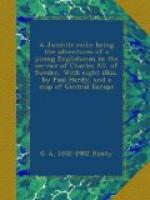“Such ways may pass in a London usurer, but they don’t do for us country folk; and each farm that he has taken has closed the doors of a dozen good houses to John Dormay. I fear that Celia has a bad time with him, though she is not one to complain. I let Charlie go over to Rockley, much oftener than I otherwise should do, for her sake and Ciceley’s, though I would rather, a hundred times, that they should come here. Not that the visits are pleasant, when they do come, for I can see that Celia is always in fear, lest I should ask her questions about her life at home; which is the last thing that I should think of doing, for no good ever comes of interference between man and wife, and, whatever I learned, I could not quarrel with John Dormay without being altogether separated from Celia and the girl.
“I am heartily glad that Charlie has given Alured a sound thrashing. The boy is too modest. He only said a few words, last evening, about the affair, and I thought that only a blow or two had been exchanged. It was as much as I could do, not to rub my hands and chuckle, when his father told me all about it. However, I must speak gravely to Charlie. If he takes it up, every time a Whig speaks scornfully of the king, he will be always in hot water, and, were he a few years older, would become a marked man. We have got to bide our time, and, except among friends, it is best to keep a quiet tongue until that time comes.”
To Sir Marmaduke’s disappointment, three more years went on without the position changing in any Way. Messengers went and came between France and the English Jacobites, but no movement was made. The failure of the assassination plot had strengthened William’s hold on the country, for Englishmen love fair play and hate assassination, so that many who had, hitherto, been opponents of William of Orange, now ranged themselves on his side, declaring they could no longer support a cause that used assassination as one of its weapons. More zealous Jacobites, although they regretted the assassination plot, and were as vehement of their denunciations of its authors as were the Whigs, remained staunch in their fidelity to “the king over the water,” maintaining stoutly that his majesty knew nothing whatever of this foul plot, and that his cause was in no way affected by the misconduct of a few men, who happened to be among its adherents.
At Lynnwood things went on as usual. Charlie continued his studies, in a somewhat desultory way, having but small affection for books; kept up his fencing lesson diligently and learned to dance; quarrelled occasionally with his cousin Alured, spent a good deal of his time on horseback, and rode over, not unfrequently, to Rockley, choosing, as far as possible, the days and hours when he knew that Alured and his father were likely to be away. He went over partly for his own pleasure, but more in compliance with his father’s wishes.
“My cousin seldom comes over, herself,” the latter said. “I know, right well, that it is from no slackness of her own, but that her husband likes not her intimacy here. It is well, then, that you should go over and see them, for it is only when you bring her that I see Ciceley. I would she were your sister, lad, for she is a bright little maid, and would make the old house lively.”




